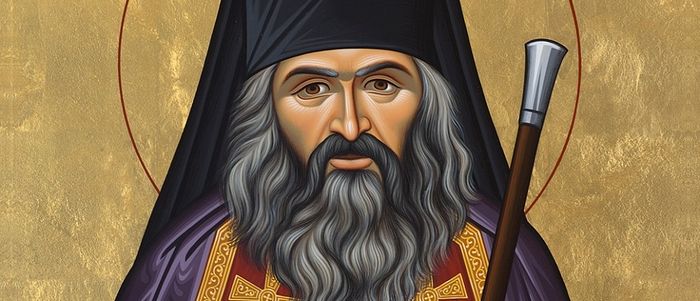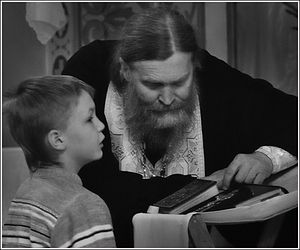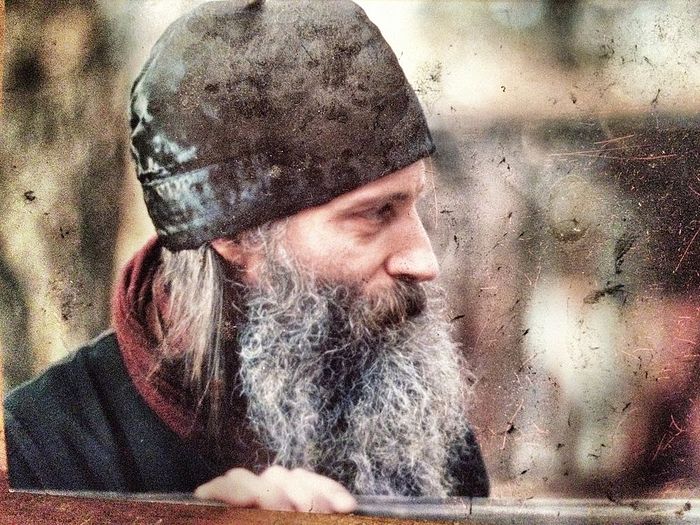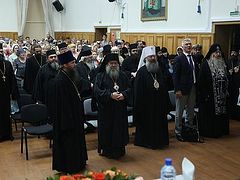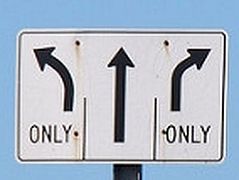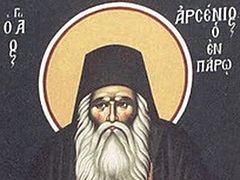Part 5. How to Prepare for Holy Communion.
Several years ago Fr. Alexey Young (now Hieroschemamonk Ambrose) gave a parish retreat entitled “Orthodox Spirituality” which was turned into a six-part VHS series produced by Christian Activist Productions. Fr. Alexey was a spiritual child of Fr. Seraphim Rose, and, as these videos attest, acquired his talent for synthesizing the Patristic Tradition and communicating deep subjects in easy-to-understand language. As the videos are in a format that cannot be posted we will be posting articles, with Fr. Ambrose’s blessing, based on notes on the videos, throughout the Apostles' Fast and beyond in honor of the saints who have become masters of spirituality while yet in their earthly lives.
In this final installment Fr. Alexey offers some insightful words on the role of a spiritual father in our lives and how to relate to him, seeking to avoid deception leading us to a true knowledge of God. Fr. Alexey also offers some recollections of his own spiritual father, Fr. Seraphim Rose.
In the spiritual life we must be very careful about the danger of spiritual deception—prelest in Russian, or plani in Greek—which is the condition of delusion or illusion. The closest word in English is actually “beguilement,” almost as if a spell has been cast. We can say, “I was beguiled by her blue eyes.”
Spiritual deception comes in various forms:
- Imagination: We are often more ready to believe our imagination than reality, refusing to be corrected.
- Fancy: This is feelings of delight and pleasure, not as ruinous as imagination, but which can lead to frightful delusions. In this condition everything in life is predicated upon whether it will bring pleasure. This is another form of self-deception.
- Opinion: We often insist on holding an opinion unwaveringly, with conviction, even though it may lead to grave trouble. If your opinion is un-Orthodox it can lead you right out of the Church.
It is very easy to be deceived in our fallen state and we often deceive ourselves by trying to understand what’s going on. Thus it’s very important to have a spiritual father. The basic cause of deception is despair and a lack of repentance. Proper repentance leads to joy because by it we get in touch with our true self as a creature of God our Creator.
St. John Climacus writes in his Ladder of Divine Ascent that repentance causes a joyful sorrow—a spiritualized emotion. It is joy because we are in touch with what we really are, but sorrow because what we really are is unimpressive. At the same time there is no despair because now you’re on the path to salvation and grace is starting to work.
Our culture feeds our need to feel special. In large families parents don’t always have enough time to make all kids feel special, but such kids are often more emotionally healthy—they’re just one of the group and must learn to get along with normal feelings. They have a more realistic sense of what life is about.
Uncorrected spiritual deception can lead us out of the Church. The Church is a spiritual hospital, not an association of pious people. It is the Body of Christ where healing happens, and the primary physician is Christ Himself, with the priest representing Him. St. Gregory the Theologian calls priests therapists because they are to cure men’s souls. Thus the priest himself must be well on the way to healing—you can’t give what you don’t have. A priest doesn’t give out tickets to Heaven, but rather, is there to assist in spiritual and sometimes even physical healing.
A priest is a spiritual father and therapist but not a psychologist. Psychology’s approach is man-centered, while that of a priest is God-centered. St. Gregory the Theologian said that the first principle of spiritual direction is to affirm that people are different in temperament and circumstance, and so a priest must tailor to individual needs. A priest needs to know about the family of the person who came to him. People develop differently at different speeds.
A spiritual director must be empathetic and have genuine compassion without entering into their illness or tragedy to such a degree that his ability to help is weakened. People are often looking for a priest to be the father they never had. It’s generally not a good idea to work out your history with your father with your priest—it’s not fair to him and he might not have the tools to do it. Let him be the priest.
Don’t enter into a co-dependent relationship with your priest. Don’t define your well-being by whether he talked to you this week. It’s not a priest’s job to be your friend, but to give spiritual authority. You don’t need a rich, full relationship with him.
In twelve years I never had more than a half-dozen long conversations with my spiritual father, Fr. Seraphim, but I received wonderful advice from him. I never thought of him as a friend and never expected more than that from him.
A parish priest is automatically the spiritual father of his flock unless a parishioner specifically arranges to go elsewhere. It’s not good to go shopping around though for a priest that will be nicest, or whatever you’re looking for. What you need is a priest who will tell you the truth and be severe when necessary. You’re not looking for a friend, but a spiritual director. A priest tries to give a good remedy, but he’s not infallible. He can make mistakes but he doesn’t mean any harm.
The fringes on the bottom of the priest’s epitrachelion symbolize the spiritual children that he carries around his neck, just as Christ carries His sheep on His shoulders. The spiritual father has the task of leading you to God-centeredness, although we often find ourselves resisting this. We enjoy the web of prelest we have woven. The spiritual life is full of contradictions, and ups and downs, but the spiritual father calls us back to reailty.
There is no better knowledge than to know how you stand before God. It is the science of sciences because if we are well with God then we are well with everything. Conversely, if you’re not well with God then it doesn’t matter how you appear in the eyes of the world. There are wrong ways of trying to find out how you stand with God, such as pestering your spiritual father to try to figure it out.
However, there may be small signs of grace that your priest can help you see:
- If you’re discontented with your spiritual state then be thankful to God—one of the best gifts is to be dissatisfied. A good spiritual father keeps his children in state of dissatisfaction. Don’t rest on your laurels—we’re always either progressing or digressing.
- A sign of growth is that we make new beginnings and fresh starts. Start again no matter how many times you have to do it, and don’t get discouraged. Making new beginnings is not being fickle if it’s about a true return to God.
- A sign of progress is when we have something definite in view, not just a vague concept of spiritual direction. Your priest ought to have some sense of where you’re going, what your spiritual gifts are, and discernment of how to use them to find fulfillment.
To overcome vices or habits it helps to have a particular goal and work on it with your spiritual father. Have a plan, “by this day I will stop doing x, y, or z.” Being too vague is like attacking no particular part of the enemy’s line, like shooting without taking aim.
- A strong feeling that God wants something particular from us, even if don’t know what it is, means we’re not self-satisfied and are truly struggling for discernment and focus, for an external or internal calling. This is sometimes called having a “spiritual attraction”—which direction the heart is leading and pulling. It is a very great gift to have these attractions and it is important to share them with your spiritual father.
- An active desire for holiness is a sign of grace.[1] Contact with genuine holiness hurts because we’re so wretched, self-centered, spoiled, and ungrateful. The canonization of St. John Maximovitch was a blessing, but a blessing that hurt—it was the pain of heart that reminds you how far from holiness you are.
I converted because I came into contact with holiness—specifically St. John and others. I wanted what he had so I had to live his life, and that meant becoming Orthodox.
St. Theophan the Recluse says to think of a toothache before its fixed—it hurts but you must carry on with regular life, with it constantly there nagging in the background. That is what pain of heart, longing for God, and the desire for holiness should be like—always there nagging in the background as a constant reminder. Its later than you think![2]
The desire for holiness, even if it comes and goes, is a sign of progress. It has nothing to do with pride. The desire of holiness means we have an awareness of how unholy we are. It means we’re not lukewarm, thank God! A spiritual father can be very helpful in this regard.
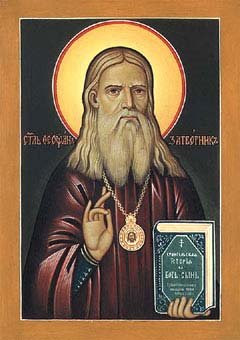
St. Innocent teaches that if we examine ourselves more attentively then it becomes clear that it’s not because the way is difficult that we don’t enter Heaven, but because we have no real desire to do so. We don’t want to trouble ourselves about it. He who earnestly desires will always seek despite obstacles, and he who goes on the path fervently for every victory, every sorrow, every victory over himself, every restraining of himself, for every act and good desire, and intention will be rewarded seventy times seven even in this life. What awaits in Heaven can’t even be told or imagined, so don’t be afraid to follow Christ. Don’t delay. Go while the doors are still open, and even while we are still a long way off our Father will come to meet us on the way, kiss us, put a garment on us and lead us to the wedding room where He dwells with His Apostles, martyrs, and all the saints. You will dwell with true and eternal joy.
But when the doors of the Kingdom are closed to you, if you die without repentance, then however much you want or try to enter you won’t be admitted. You knock and say, “Lord we know Thee, we were baptized in Your name, we have worked miracles, etc” but Christ will say “I don’t know you, you’re not Mine. Depart into the eternal fire prepared for devil and his angels, where there is weeping and gnashing of teeth. Amen, amen.”
Question: If despair is a lack of repentance, and despair is because of a lack of repentance that leads to more despair, then how to break the cycle?
Answer: The spiritual father leads you to true repentance and a real turning away from sin. We often have regret over what we did, but we didn’t turn away from it, and this often causes despair.
Question: Can you offer us some insight into Fr. Seraphim Rose?
Answer: He was a convert from southern CA, and died at 48. He converted into ROCOR in the early 60’s and met St. John, from whom he received spiritual direction and by whom he was trained in theology at the cathedral in San Francisco. He met Fr. Herman and they were blessed to form a lay brotherhood dedicated to Fr. Herman of Alaska, starting the The Orthodox Word journal also with the blessing of St. John.
I met Fr. Seraphim in ’65 or ’66 as a Catholic layman searching for truth. Fr. Seraphim was running the Eastern Orthodox Books and Icons store and printing The Orthodox Word on a hand-press in the back of the store. The shop smelled like incense and cabbage soup—smells I now associate with holiness!
I was searching but I thought I could take what I liked from Orthodoxy and apply it to Catholicism, and have the best of both worlds. Fr. Seraphim perceived this quickly and insightfully. We had had almost no conversation but he looked at me and said, “You can’t be both.” I was offended by his “intolerance,” and then he said, “You don’t even have the correct understanding of the Mother of God.” I was again offended because as a Catholic I had a high view of the Theotokos. Fr. Seraphim didn’t engage in small talk. He just went to the heart of matter—nothing frivolous.
Fr. Seraphim suggested me to read Against False Union by Alexander Kalomiros, but I didn’t know what to make of it. I knew I wasn’t on Fr. Seraphim’s level so I couldn’t discuss it with him.
I later met St. John and went to his funeral, which was incredible. I continued contact with Fr. Seraphim. I was always troubled by what he had said to me. I needed an answer and couldn’t figure it out on my own. I knew I had to take seriously his words that you can’t be both, or you’ll become neither, and very unhappy.
In ’66 or ’67 Frs. Seraphim and Herman moved to Platina and were later tonsured. I converted with my whole family, which I attribute directly to St. John. Then Abp. Anthony appointed Fr. Seraphim as my spiritual father, which lasted for the next twelve years, until Fr. Seraphim’s death in 1982.

